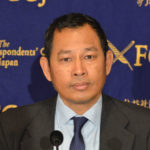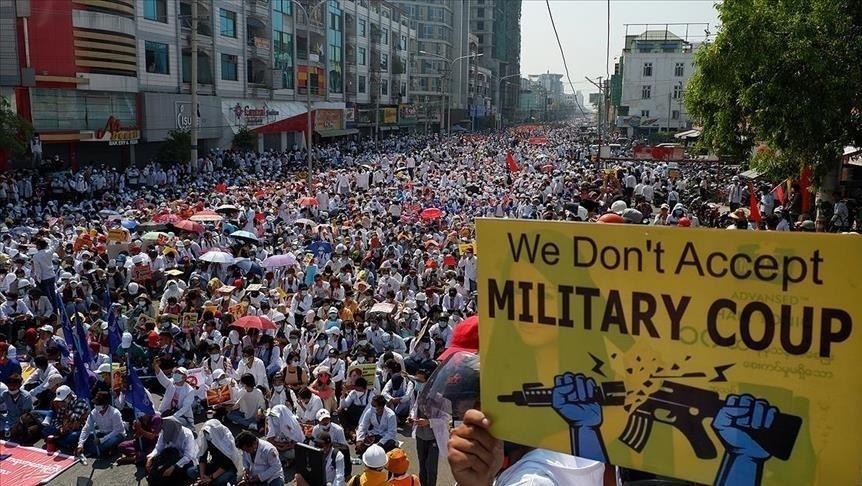The Myanmar Military Is Destroying Its Public Image–Politics Won’t Be the Same
ASIA--PACIFIC, 29 Mar 2021
Maung Zarni – TRANSCEND Media Service
26 Mar 2021 –The images from the streets of Myanmar cities tell a brutal story. Ordinary citizens are taking to the streets to protest the military coup of Feb. 1, and the armed forces, again and again, are opening fire. By now more than 300 people — virtually all of them unarmed — have been killed around the country.
This rampant brutality has led to widespread revulsion among the populace, in ways that are likely to reverberate for years to come. There are, of course, many elements in Myanmar society — especially among members of the ethnic minorities such as the Rohingya, Shan, Karen, Kachin along the country’s periphery — who have never harbored illusions about the nature of the armed forces. The long years of military dictatorship, and the corruption and crimes against humanity, war crimes and even genocide, all with total impunity, that went with it, saw to that.
The sense of rage is palpable. Hundreds of thousands of social media comments and public speeches, group posts, communal discussions and personal conversations attest to the deepening popular anger at the armed forces. It has become customary to refer to the troops as “terrorists” or even as “dogs of war,” an especially harsh term in Myanmar-language discourse. A nationally acclaimed poet and educator, whose writings have been read by millions of children and adolescents in school, recently posted a widely shared text on Facebook in which he described the military as a cross between a murderous mafia and a fascist-like occupier.
On March 4, United Nations human rights chief Michelle Bachelet issued a blunt statement calling for an immediate end to murder, enforced disappearances and other crimes against humanity being committed against unarmed and peaceful protesters. She specifically condemned “documented attacks against emergency medical staff and ambulances attempting to provide care to those who have been injured.”
Several defectors from the security forces have told English and Myanmar-language media outlets how their superiors ordered them to shoot to kill — including targeting family members who oppose the coup. Commanders describe neighborhoods and communities as “front lines” and refer to unarmed civilian protesters as “dangerous enemies” allegedly sitting on concealed caches of weapons in civilian homes, just waiting to attack.
This erosion of the military’s public image potentially has far-reaching consequences. Before the Feb. 1 coup, Aung San Suu Kyi — de facto leader of the civilian government and once lionized leader of the pro-democracy movement — had pursued a policy of grudging accommodation with the military. That included continuing recognition of the 2008 constitution, drawn up by the generals to enshrine a dominant political role for the military as they sought to step back from outright rule. As part of her pragmatic policy of reconciliation with the armed forces, Aung San Suu Kyi even referred to the generals as “my father’s sons,” an allusion to her father Aung San, the military leader of the country’s anti-colonial independence movement during and after World War II.
Since the 1 Feb coup, ironically, she has been in the custody of that very same military, which has said that it will soon try her for alleged crimes during her time in office.
Since the coup, a group consisting primarily of deposed lawmakers from Aung San Suu Kyi’s own National League for Democracy has played a leading role in the protest movement. Sources close to this group told me they initially stayed within the framework laid down by their leader. They were to operate within Aung San Suu Kyi’s framework of reconciliation without justice, maintain distance from the armed organizations of the rebellious ethnic groups, to work for gradual constitutional change, and to ignore the ethnic identity of the Rohingya minority and the genocide committed against them by the military.
Yet in recent weeks, reflecting the growing popular indignation over the role of the military, the group has issued a series of statements that amount to a complete break with Aung San Suu Kyi’s policy of accommodation.
It is now clear that Myanmar society is burying for good the decades-old myth of the armed forces as the selfless defenders of national unity. If nothing changes, it looks as though Aung San Suu Kyi’s ruinous policy of accommodation with the generals is likely to meet a similar fate.
___________________________________________
 A Buddhist humanist from Burma, Maung Zarni is a member of the TRANSCEND Network for Peace Development Environment, former Visiting Lecturer with Harvard Medical School, specializing in racism and violence in Burma and Sri Lanka, and Non-resident Scholar in Genocide Studies with Documentation Center – Cambodia. Zarni s the co-founder of FORSEA, a grass-roots organization of Southeast Asian human rights defenders, coordinator for Strategic Affairs for Free Rohingya Coalition, and an adviser to the European Centre for the Study of Extremism, Cambridge. Zarni holds a PhD (U Wisconsin at Madison) and a MA (U California), and has held various teaching, research and visiting fellowships at the universities in Asia, Europe and USA including Oxford, LSE, UCL Institute of Education, National-Louis, Malaya, and Brunei. He is the recipient of the “Cultivation of Harmony” award from the Parliament of the World’s Religions (2015). His analyses have appeared in leading newspapers including the New York Times, The Guardian and the Times. Among his academic publications on Rohingya genocide are The Slow-Burning Genocide of Myanmar’s Rohingyas (Pacific Rim Law and Policy Journal), An Evolution of Rohingya Persecution in Myanmar: From Strategic Embrace to Genocide, (Middle East Institute, American University), and Myanmar’s State-directed Persecution of Rohingyas and Other Muslims (Brown World Affairs Journal). He co-authored, with Natalie Brinham, Essays on Myanmar Genocide.
A Buddhist humanist from Burma, Maung Zarni is a member of the TRANSCEND Network for Peace Development Environment, former Visiting Lecturer with Harvard Medical School, specializing in racism and violence in Burma and Sri Lanka, and Non-resident Scholar in Genocide Studies with Documentation Center – Cambodia. Zarni s the co-founder of FORSEA, a grass-roots organization of Southeast Asian human rights defenders, coordinator for Strategic Affairs for Free Rohingya Coalition, and an adviser to the European Centre for the Study of Extremism, Cambridge. Zarni holds a PhD (U Wisconsin at Madison) and a MA (U California), and has held various teaching, research and visiting fellowships at the universities in Asia, Europe and USA including Oxford, LSE, UCL Institute of Education, National-Louis, Malaya, and Brunei. He is the recipient of the “Cultivation of Harmony” award from the Parliament of the World’s Religions (2015). His analyses have appeared in leading newspapers including the New York Times, The Guardian and the Times. Among his academic publications on Rohingya genocide are The Slow-Burning Genocide of Myanmar’s Rohingyas (Pacific Rim Law and Policy Journal), An Evolution of Rohingya Persecution in Myanmar: From Strategic Embrace to Genocide, (Middle East Institute, American University), and Myanmar’s State-directed Persecution of Rohingyas and Other Muslims (Brown World Affairs Journal). He co-authored, with Natalie Brinham, Essays on Myanmar Genocide.
Originally published by The Washington Post
Tags: Asia, Aung San Suu Kyi, Authoritarianism, Burma, Coup, Democracy, Demonstrations, Dictatorship, Direct violence, Human Rights, Justice, Military Intervention, Myanmar, Nonviolent Action, Protests, Revolution, Social justice, Southeast Asia, Structural violence, United Nations
This article originally appeared on Transcend Media Service (TMS) on 29 Mar 2021.
Anticopyright: Editorials and articles originated on TMS may be freely reprinted, disseminated, translated and used as background material, provided an acknowledgement and link to the source, TMS: The Myanmar Military Is Destroying Its Public Image–Politics Won’t Be the Same, is included. Thank you.
If you enjoyed this article, please donate to TMS to join the growing list of TMS Supporters.

This work is licensed under a CC BY-NC 4.0 License.
